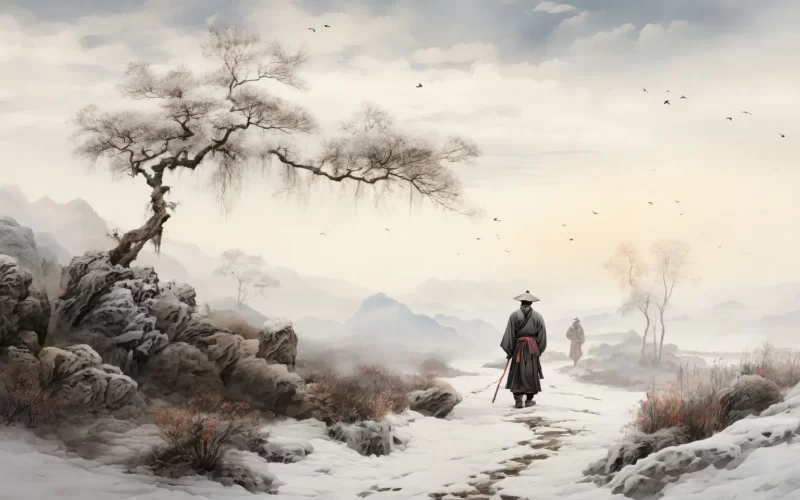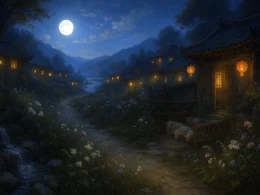By my old gate, among yellow grasses,
Still we linger, sick at heart.
The way you must follow through cold clouds
Will lead you this evening into snow.
Your father died; you left home young;
Nobody knew of your misfortunes.
We cry, we say nothing. what can i wish you,
In this blowing wintry world?
Original Poem
「送李端」
卢纶
故关衰草遍, 离别正堪悲。
路出寒云外, 人归暮雪时。
少孤为客早, 多难识君迟。
掩泪空相向, 风尘何处期。
Interpretation
This poem was composed during an era of constant warfare and social upheaval, as the poet endured the hardships of displacement and separation. Written while bidding farewell to a cherished friend, it brims with melancholy, using the parting scene to express the value of friendship and lamentations of fate, while reflecting both personal and collective tragedy.
First Couplet: "故关衰草遍,离别正堪悲。"
Gù guān shuāi cǎo biàn, lí bié zhèng kān bēi.
Withered grasses blanket the old frontier; no moment more grieves than this parting.
The opening establishes the scene with "withered grasses" creating a desolate atmosphere. The emotion is embedded in the landscape, planting sorrow deep in the farewell setting to establish the poem's plaintive tone.
Second Couplet: "路出寒云外,人归暮雪时。"
Lù chū hán yún wài, rén guī mù xuě shí.
Your path vanishes beyond cold clouds; I return beneath twilight snow.
Here the concrete farewell unfolds - frigid clouds overhead, evening snow falling. As the friend's figure recedes into the distance, the gaze lingers and emotions intensify, with longing condensed along the vanishing horizon.
Third Couplet: "少孤为客早,多难识君迟。"
Shào gū wéi kè zǎo, duō nàn shí jūn chí.
Orphaned young, I wandered too soon; through countless trials, I knew you too late.
The mood shifts inward to personal history, revealing a troubled destiny and lamenting their belated friendship. The profound mutual understanding moves readers deeply.
Fourth Couplet: "掩泪空相向,风尘何处期。"
Yǎn lèi kōng xiāng xiàng, fēng chén hé chù qī.
Tearfully we face each other, wordless; in this turbulent world, where shall we meet again?
The poem's pervasive sorrow crescendos here. Tears flow silently in helpless despair, while "turbulent world" underscores the hopelessness of reunion, amplified by chaotic realities.
Holistic Appreciation
Centered on sorrow, the poem progresses from scene to emotion. The first couplet establishes the bleak farewell backdrop, the second depicts the parting moment, the third reflects on personal misfortunes, and the fourth concludes with endless longing. Genuine in feeling and measured in rhythm, its quiet pain resonates deeply. By intertwining personal exile with the rarity of friendship and agony of separation, the poet elevates this farewell verse into a life ballad - expressing not just immediate parting grief but also personal and epochal tragedy.
Artistic Merits
- Scenes amplify emotions: "Withered grasses," "cold clouds," and "twilight snow" create a mournful atmosphere where parting sorrow flows naturally.
- Progressive structure: Moving from farewell to life reflections before concluding with uncertain reunion, it builds layered, profound emotions.
- Unadorned yet powerful: Plain language carries profound feeling, achieving moving effects without embellishment.
Insights
This poem reminds us how rare true friendship is, and how painful its interruption. When facing uncontrollable destiny and turbulent times, humans crave emotional solace. Though writing through sorrow, the poet plants hope - that despite worldly chaos, reunion remains possible. This cherishing of bonds and reflection on fate offers timeless inspiration for life's journey today.
Poem translator
Kiang Kanghu
About the poet

Lu Lun (卢纶), 748 - 798 A.D., was a native of Yongji, Shanxi Province, and was one of the "Ten Scholarly Men of the Dali Dynasty". Lu Lun was a judge of the Marshal's Office in Hezhong, and he served as the inspector of the Ministry of Revenue. His poems were more eloquent and liberal,












